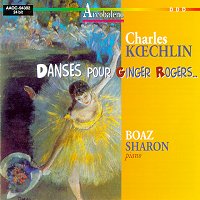|


Global Fascinations and Sophistications
Charles Koechlin

A salute to a new label - Arcobaleno, of the EMS Music Group Belgium
- for leading us down untrodden paths. Charles Koechlin, Parisian-born composer
in 1867, died 1950, studied with Massenet and Fauré at the Conservatoire
from 1890. Eschewing schools and musical fashions, he wrote a great deal
of music which is seldom heard, exploring bitonalites and partly delving
into the realm of atonality. Structures are complex, but the polyphony,
instead of confusing the listener, is attractively novel, stemming from
the mediaeval period through to modern innovators like Stravinsky and Satie.
Cinema captured his imagination; hence the Seven Stars Symphony
which depicted topical screen idols. Danses pour Ginger Rogers, Op
163, in its piano version is a pretty fair description of the lovely lady's
art as she caused male hearts to flutter in her several money-spinning films
[listen - track 1, 0:00-1:00].
Boaz Sharon, who has affiliations with the Israeli Liszt Society and
the Prague International Piano Festival, sees it that way, too, using the
piece as a pivot to the rest of his programme - Les Heures Persanes,
inspired by the mysteries and enchantments of the Orient, La Prière
de l'Homme, from 113 pieces written in honour of Koechlin's idol
Lilian Harvey, and the four section Nouvelles Sonatines Francaises
- music steeped in folk lore and more conventional in style.
The composer's fans will already know his massive score for Kipling's
Jungle Book, so his music per se has obvious appeals to literary
lovers. Here, the flow centres on continuity of varied subject matter -
every Frenchman's penchant to fame.
Continue >>
Copyright © 6 September 2000
Bill Newman, Edgware, UK
 CD INFORMATION - ARCOBALENO AAOC 94382
READ MORE ABOUT ARCOBALENO
<< Music
& Vision home
Hummel >>
CD INFORMATION - ARCOBALENO AAOC 94382
READ MORE ABOUT ARCOBALENO
<< Music
& Vision home
Hummel >>
 |
To listen to the aural illustrations in this review,
you may need to download RealNetworks' realplayer G2. |
|

